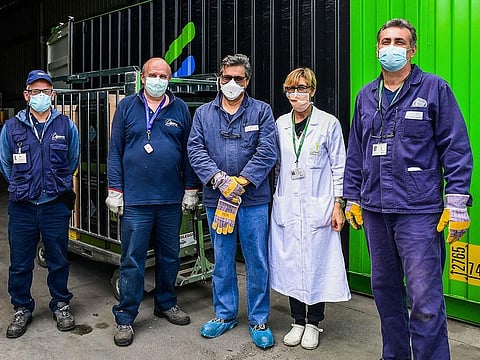COVID-19: Medical waste piles up in Italy's virus epicentre
The virus has officially killed around 27,000 in Italy

Cremona, Italy: Contaminated hospital waste is piling up in the Italian epicentre of the coronavirus crisis.
Medics at the Cremona hospital in the Mediterranean country's north say the surge in patients since March has made the issue of its safe disposal particularly sensitive.
Staff must be trained to properly handle everything from sheets and masks to syringes - standard hospital items now laced with added danger in a pandemic caused by a new and still unexplored disease.
"Compared to the time before the pandemic, the amount of potentially infectious waste has doubled or nearly tripled," the hospital's waste management director Maria Rosaria Vino told AFP.
The virus has officially killed around 27,000 in Italy.
Its spread is ebbing and the country's leaders are preparing to lift some of the strictest confinement measures in the weeks to come.
But the mood at the Cremona hospital is tense.
Increased risk
"The risk is increased because we handle potentially infectious waste," said Luciano Masseroni, a waste operator.
"We collect the waste from various services, but we do not know which ones they are."
The waste is now sealed in plastic bags and stored in a separate room to avoid airborne particles from spreading across hospital halls.
The bags are then boxed and hermetically sealed, their contents labeled on the outside.
The boxes are eventually packed onto carts and sent for removal in sealed metal containers.
All the waste is evacuated by freight elevator and a passageway specially dedicated to it in the hospital basement.
None of it can spend more than five days waiting to be shipped out by subcontractors.
The entire operation is performed by covered-up teams who take their jobs extremely seriously.
"We have trained disposal teams to wear all the protective equipment. They do not face any added risk," hospital medical director Lorenzo Cammelli said.
"The transport officials find the containers already sealed. There is no additional risk for them either."
But caution is on everyone's mind.
Nurse Omar Semlali is one of the first to handle the equipment - and the first to start the process of its removal.
"The disposal containers fill very quickly and the most important thing is not to overstuff them because then they do not close properly," Semlali said.
"We are particularly careful making sure that they are properly sealed."
Sign up for the Daily Briefing
Get the latest news and updates straight to your inbox







